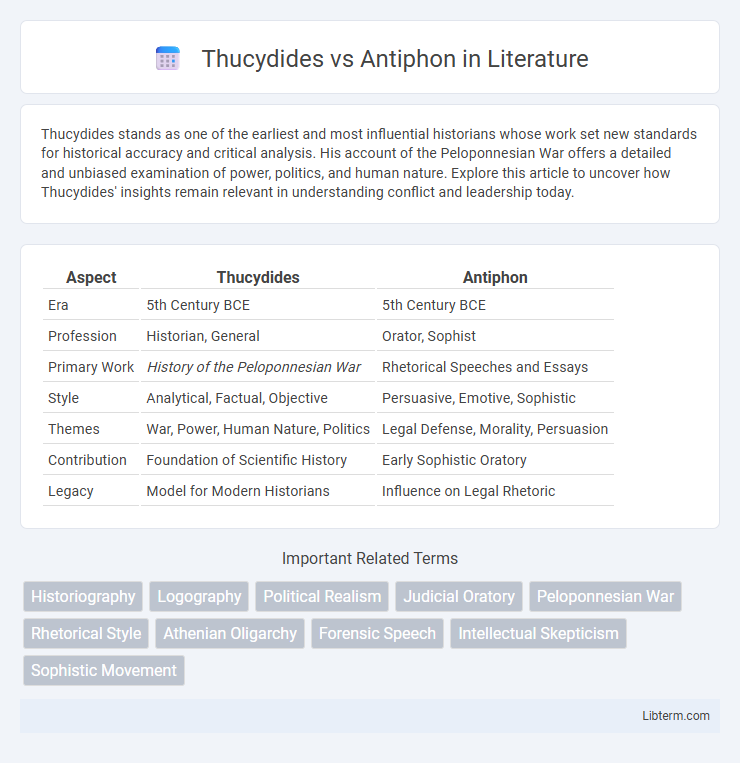Thucydides stands as one of the earliest and most influential historians whose work set new standards for historical accuracy and critical analysis. His account of the Peloponnesian War offers a detailed and unbiased examination of power, politics, and human nature. Explore this article to uncover how Thucydides' insights remain relevant in understanding conflict and leadership today.
Table of Comparison
| Aspect | Thucydides | Antiphon |
|---|---|---|
| Era | 5th Century BCE | 5th Century BCE |
| Profession | Historian, General | Orator, Sophist |
| Primary Work | History of the Peloponnesian War | Rhetorical Speeches and Essays |
| Style | Analytical, Factual, Objective | Persuasive, Emotive, Sophistic |
| Themes | War, Power, Human Nature, Politics | Legal Defense, Morality, Persuasion |
| Contribution | Foundation of Scientific History | Early Sophistic Oratory |
| Legacy | Model for Modern Historians | Influence on Legal Rhetoric |
Introduction to Thucydides and Antiphon
Thucydides, the ancient Athenian historian, is renowned for his critical and empirical approach in documenting the Peloponnesian War, emphasizing factual accuracy and political realism. Antiphon, a prominent sophist and statesman, contributed to rhetoric and legal speeches, often blending persuasive techniques with political insights. Understanding Thucydides' methodical historical narrative alongside Antiphon's rhetorical skill provides key perspectives on classical Athenian intellectual and political culture.
Historical Context: Classical Athens
Thucydides and Antiphon emerged as key figures in Classical Athens during the 5th century BCE, a period marked by intense political turmoil and the Peloponnesian War. Thucydides, a historian and general, offered a rigorous, empirical account of the war's causes and effects, emphasizing realpolitik and human nature. Antiphon, a leading sophist and orator, influenced Athenian legal and political thought, especially in defending oligarchic interests amid the democracy's crisis.
Thucydides: Life, Works, and Philosophical Approach
Thucydides, an ancient Athenian historian born around 460 BCE, is renowned for his critical and empirical approach to documenting the Peloponnesian War, emphasizing eyewitness accounts and factual accuracy. His seminal work, "History of the Peloponnesian War," revolutionized historiography by prioritizing political realism and human nature over mythological explanations, marking a philosophical shift toward rational analysis of power, conflict, and human behavior. Unlike Antiphon, whose contributions were primarily in sophistic rhetoric and oratory, Thucydides' legacy lies in his methodological rigor and philosophical inquiry into the dynamics of war and society.
Antiphon: Life, Works, and Rhetorical Style
Antiphon, an influential 5th-century BCE Athenian orator and sophist, is known for pioneering early rhetorical techniques and contributing significantly to the development of forensic oratory. His extant works, including surviving speeches and fragments, showcase a direct, concise style emphasizing logical argumentation and emotional appeal, distinguishing him from contemporaries like Thucydides, who favored historical narrative and analytical prose. Antiphon's rhetorical style laid foundational principles for classical rhetoric, blending persuasion with legal expertise to influence Athenian law courts and political discourse.
Political Thought: Democracy vs. Oligarchy
Thucydides championed democracy by highlighting the value of popular sovereignty and collective decision-making in Athens, emphasizing accountability and citizen participation during the Peloponnesian War. In contrast, Antiphon advocated for oligarchy, arguing that rule by elite, knowledgeable individuals ensured stability, order, and efficient governance amid political turmoil. Their opposing views illustrate the fundamental conflict between democratic inclusivity and oligarchic control in classical Greek political thought.
Philosophical Method: Empiricism and Rationalism
Thucydides pioneered empirical historiography by meticulously documenting events through direct observation and factual evidence, emphasizing empirical verification over mythological explanation. Antiphon, conversely, embodied early rationalism by applying logical reasoning and abstract principles to understand human nature and ethics, often prioritizing intellectual deduction over sensory experience. The philosophical methods of both thinkers highlight the foundational tension between empiricism's reliance on observable data and rationalism's trust in innate reason as paths to knowledge.
Thucydides on Human Nature and Power
Thucydides explores human nature as driven by fear, self-interest, and the desire for power, emphasizing how these forces shape political behavior and conflicts. His account of the Peloponnesian War reveals that power struggles result from innate human tendencies toward dominance and survival. In contrast to the rhetorical style of Antiphon, Thucydides adopts a critical, empirical approach highlighting how power dynamics influence historical events and human interactions.
Antiphon on Justice and Ethics
Antiphon's approach to justice and ethics centers on natural law and individual self-interest, contrasting with Thucydides' focus on power dynamics and pragmatic realism in human affairs. While Thucydides depicts justice as a tool shaped by political necessity during conflicts such as the Peloponnesian War, Antiphon argues for an inherent sense of justice grounded in nature that transcends conventional laws. Antiphon's ethical framework emphasizes equality and the idea that all humans share an innate moral compass, challenging the relativistic and often cynical perspective found in Thucydides' historical narratives.
Comparative Analysis: Legacy and Influence
Thucydides' legacy endures as the father of scientific history, emphasizing empirical evidence and political realism, influencing historians and political theorists for centuries. Antiphon, primarily known as a sophist and early rhetorician, significantly impacted the development of Greek oratory and legal advocacy through his innovative use of speech and argumentation. While Thucydides shaped historical methodology and political analysis, Antiphon's contributions advanced rhetorical techniques essential for law and democratic discourse.
Conclusion: Enduring Relevance of Thucydides and Antiphon
Thucydides' rigorous historical methodology and Antiphon's early contributions to rhetoric underscore their lasting impact on classical scholarship and political thought. The enduring relevance of Thucydides lies in his empirical approach to documenting the Peloponnesian War, providing timeless insights into power dynamics and human nature. Antiphon's work in sophistic rhetoric continues to influence the development of persuasive communication and legal argumentation.
Thucydides Infographic

 libterm.com
libterm.com